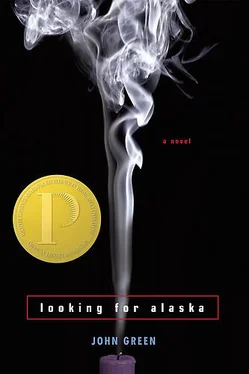John Green - Looking for Alaska
Здесь есть возможность читать онлайн «John Green - Looking for Alaska» — ознакомительный отрывок электронной книги совершенно бесплатно, а после прочтения отрывка купить полную версию. В некоторых случаях можно слушать аудио, скачать через торрент в формате fb2 и присутствует краткое содержание. Год выпуска: 2005, Жанр: Современная проза, на английском языке. Описание произведения, (предисловие) а так же отзывы посетителей доступны на портале библиотеки ЛибКат.
- Название:Looking for Alaska
- Автор:
- Жанр:
- Год:2005
- ISBN:нет данных
- Рейтинг книги:4.5 / 5. Голосов: 2
-
Избранное:Добавить в избранное
- Отзывы:
-
Ваша оценка:
- 100
- 1
- 2
- 3
- 4
- 5
Looking for Alaska: краткое содержание, описание и аннотация
Предлагаем к чтению аннотацию, описание, краткое содержание или предисловие (зависит от того, что написал сам автор книги «Looking for Alaska»). Если вы не нашли необходимую информацию о книге — напишите в комментариях, мы постараемся отыскать её.
Looking for Alaska
Looking for Alaska — читать онлайн ознакомительный отрывок
Ниже представлен текст книги, разбитый по страницам. Система сохранения места последней прочитанной страницы, позволяет с удобством читать онлайн бесплатно книгу «Looking for Alaska», без необходимости каждый раз заново искать на чём Вы остановились. Поставьте закладку, и сможете в любой момент перейти на страницу, на которой закончили чтение.
Интервал:
Закладка:
After classes, I walked over to Lara's room and knocked, and then she stood in the doorway, looking like, What?
What now? You've done the damage you could, Pudge, and I looked past her, into the room I'd only entered once, where I learned that kissing or no, I couldn't talk to her — and before the silence could get too uncomfortable, I talked. "I'm sorry," I said.
"For what?" she asked, still looking toward me but not quite at me.
"For ignoring you. For everything," I said.
"You deedn't have to be my boyfriend." She looked so pretty, her big eyes blinking fast, her cheeks soft and round, and still the roundness could only remind me of Alaska's thin face and her high cheekbones. But I could live with it — and, anyway, I had to. "You could have just been my friend," she said.
"I know. I screwed up. I'm sorry."
"Don't forgive that asshole," Katie cried from inside the room.
"I forgeeve you." Lara smiled and hugged me, her hands tight around the small of my back. I wrapped my arms around her shoulders and smelled violets in her hair.
"I don't forgive you," Katie said, appearing in the doorway. And although Katie and I were not well acquainted, she felt comfortable enough to knee me in the balls. She smiled then, and as I crumpled into a bow, Katie said, "Now I forgive you."
Lara and I took a walk to the lake — sans Katie — and we talked. We talked — about Alaska and about the past month, about how she had to miss me and miss Alaska, while I only had to miss Alaska (which was true enough). I told her as much of the truth as I could, from the firecrackers to the Pelham Police Department and the white tulips.
"I loved her," I said, and Lara said she loved her, too, and I said, "I know, but that's why. I loved her, and after she died I couldn't think about anything else. It felt, like, dishonest.
Like cheating."
"That's not a good reason," she said.
"I know," I answered.
She laughed softly. "Well, good then. As long as you know." I knew I wasn't going to erase that anger, but we were talking.
As darkness spread that evening, the frogs croaked and a few newly resurrected insects buzzed about campus, and the four of us — Takumi, Lara, the Colonel, and I — walked through the cold gray light of a full moon to the Smoking Hole.
"Hey, Colonel, why do you call eet the Smoking Hole?" Lara asked. "Eet's, like, a tunnel."
"It's like fishing hole," the Colonel said. "Like, if we fished, we'd fish here. But we smoke. I don't know. I think Alaska named it." The Colonel pulled a cigarette out of his pack and threw it into the water.
"What the hell?" I asked.
"For her," he said.
I half smiled and followed his lead, throwing in a cigarette of my own. I handed Takumi and Lara cigarettes, and they followed suit. The smokes bounced and danced in the stream for a few moments, and then they floated out of sight.
I was not religious, but I liked rituals. I liked the idea of connecting an action with remembering. In China, the Old Man had told us, there are days reserved for grave cleaning, where you make gifts to the dead. And I imagined that Alaska would want a smoke, and so it seemed to me that the Colonel had begun an excellent ritual.
The Colonel spit into the stream and broke the silence. "Funny thing, talking to ghosts," he said. "You can't tell if you're making up their answers or if they are really talking to you."
"I say we make a list," Takumi said, steering clear of introspective talk. "What kind of proof do we have of suicide?" The Colonel pulled out his omnipresent notebook.
"She never hit the brakes," I said, and the Colonel started scribbling.
And she was awfully upset about something, although she'd been awfully upset without committing suicide many times before. We considered that maybe the flowers were some kind of memorial to herself — like a funeral arrangement or something. But that didn't seem very Alaskan to us. She was cryptic, sure, but if you're going to plan your suicide down to the flowers, you probably have a plan as to how you're actually going to die, and Alaska had no way of knowing a police car was going to present itself on I-65 for the occasion.
And the evidence suggesting an accident?
"She was really drunk, so she could have thought she wasn't going to hit the cop, although I don't know how," Takumi said.
"She could have fallen asleep," Lara offered.
"Yeah, we've thought about that," I said. "But I don't think you keep driving straight if you fall asleep."
"I can't think of a way to find out that does not put our lives in considerable danger," the Colonel deadpanned.
"Anyway, she didn't show warning signs of suicide. I mean, she didn't talk about wanting to die or give away her stuff or anything."
"That's two. Drunk and no plans to die," Takumi said. This wasn't going anywhere. Just a different dance with the same question. What we needed wasn't more thinking. We needed more evidence.
"We have to find out where she was going," the Colonel said.
"The last people she talked to were me, you, and Jake," I said to him. "And we don't know. So how the hell are we going to find out?"
Takumi looked over at the Colonel and sighed. "I don't think it would help, to know where she was going. I think that would make it worse for us. Just a gut feeling."
"Well, my gut wants to know," Lara said, and only then did I realize what Takumi meant the day we'd showered together — I may have kissed her, but I really didn't have a monopoly on Alaska; the Colonel and I weren't the only ones who cared about her, and weren't alone in trying to figure out how she died and why.
"Well, regardless," said the Colonel, "we're at a dead end. So one of you think of something to do. Because I'm out of investigative tools."
He flicked his cigarette butt into the creek, stood up, and left. We followed him. Even in defeat, he was still the Colonel.
fifty-one days after
The investigation stalled,I took to reading for religion class again, which seemed to please the Old Man, whose pop quizzes I'd been failing consistently for a solid six weeks. We had one that Wednesday morning: Share an example of a Buddhist koan. A koan is like a riddle that's supposed to help you toward enlightenment in Zen Buddhism. For my answer, I wrote about this guy Banzan. He was walking through the market one day when he overheard someone ask a butcher for his best piece of meat. The butcher answered, "Everything in my shop is the best. You cannot find a piece of meat that is not the best." Upon hearing this, Banzan realized that there is no best and no worst, that those judgments have no real meaning because there is only what is, and poof, he reached enlightenment. Reading it the night before, I'd wondered if it would be like that for me — if in one moment, I would finally understand her, know her, and understand the role I'd played in her dying. But I wasn't convinced enlightenment struck like lightning.
After we'd passed our quizzes, the Old Man, sitting, grabbed his cane and motioned toward Alaska's fading question on the blackboard. "Let's look at one sentence on page ninety-four of this very entertaining introduction to Zen that I had you read this week. 'Everything that comes together falls apart,'" the Old Man said. "Everything.
The chair I'm sitting on. It was built, and so it will fall apart. I'm gonna fall apart, probably before this chair. And you're gonna fall apart. The cells and organs and systems that make you you — they came together, grew together, and so must fall apart. The Buddha knew one thing science didn't prove for millennia after his death: Entropy increases. Things fall apart."
We are all going,I thought, and it applies to turtles and turtlenecks, Alaska the girl and Alaska the place, because nothing can last, not even the earth itself. The Buddha said that suffering was caused by desire, we'd learned, and that the cessation of desire meant the cessation of suffering. When you stopped wishing things wouldn't fall apart, you'd stop suffering when they did.
Читать дальшеИнтервал:
Закладка:
Похожие книги на «Looking for Alaska»
Представляем Вашему вниманию похожие книги на «Looking for Alaska» списком для выбора. Мы отобрали схожую по названию и смыслу литературу в надежде предоставить читателям больше вариантов отыскать новые, интересные, ещё непрочитанные произведения.
Обсуждение, отзывы о книге «Looking for Alaska» и просто собственные мнения читателей. Оставьте ваши комментарии, напишите, что Вы думаете о произведении, его смысле или главных героях. Укажите что конкретно понравилось, а что нет, и почему Вы так считаете.












